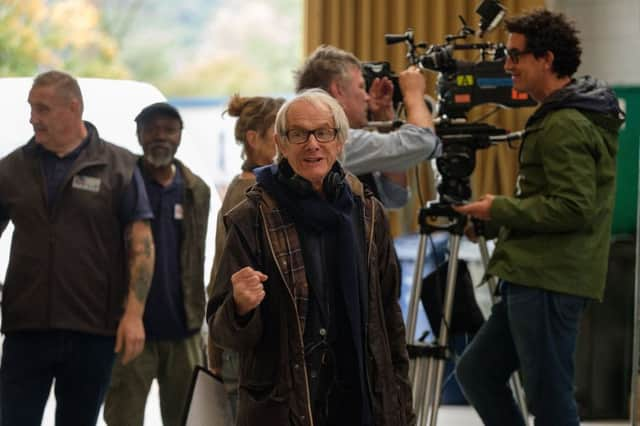Ken Loach: Why I don’t want Boris Johnson to watch my new film


Ken Loach thought his previous film might be his last.
His benefits drama I, Daniel Blake won the highest honour of the Cannes Film Festival, the Palme d’Or in 2016, as well as a BAFTA and a string of other gongs, and Loach thought it might be the final film of his long career.
“You don’t know really when you get old,” he says amiably as he sits in a high-backed chair in a London hotel. “You’re just glad you’re not in the obituaries when you wake up. You have to cross your fingers and hope tomorrow comes.”


Advertisement
Hide AdAdvertisement
Hide AdLoach is 83 now but you would never know it. He’s still working and still as passionate about shining a spotlight on social issues as ever before.
His new film, Sorry We Missed You, tackles the gig economy and zero-hours contracts, following a family buckling under the strain of unstable working conditions.
The idea for the film came out of I, Daniel Blake, when he and his longtime collaborator Paul Laverty visited food banks and were horrified by how many of the people using them were actually in employment, but their situation was so precarious they were still struggling to feed their families.


Advertisement
Hide AdAdvertisement
Hide Ad“This is all art can do,” Loach says. “Whatever the medium, to say ‘this is how we live now, this is the way the world is’ and try to understand it and the conflicts within it. And also try to understand the different interests that are pulling against each other and the consequences in people’s daily lives. Film can do that because it can let you in to relationships and to work.”
Loach has long used his work to turn his critical eye on social issues such as poverty, homelessness and labour rights, in film such as Sweet Sixteen, The Wind That Shakes The Barley and The Angels’ Share. He’s aware his platform, as one of the great British filmmakers, is rare and influential and he is determined to use it.
“You can only make a film if you feel driven to, if there is no alternative. It takes a lot of energy and commitment,” he says.
Advertisement
Hide AdAdvertisement
Hide Ad“Only a small group of people do the kind of films we do, because most cinemas are full of Hollywood commercial films, so we have been lucky to get a little corner where we can work.
“It’s a privilege and because it’s a privilege we feel we shouldn’t throw it away.”
Sorry We Missed You follows delivery driver Ricky and care worker Abbie, both on zero-hours contracts, and their children, as they face an uphill battle with debt after the 2008 financial crash.
The film shows the struggles of their jobs, which Loach sees as deeply exploitative, as Ricky races from address to address, knowing he will only be paid for the packages he delivers, and Abbie battles public transport between her elderly clients because she will only be paid for each visit.
Advertisement
Hide AdAdvertisement
Hide AdBut it also zeroes in on the impact it has on home life, how it leaves them too exhausted to spend any time together as a family and how the parents want better for their own children and fear they will succumb to the same fate.
“Leaving aside the social necessity to tell these stories, it’s a great source for drama,” Loach says. “Because where do we live our lives? We live our lives in our families and we live our lives at work and the two connect and the one has an impact on the other.
“It also puts us into the deepest feelings we have, feelings of security, feelings of love, feelings of compassion, comedy, the raw material of drama is there but in this case it’s based on the grotesque exploitation masked by a language that distorts it.
“Masked by a language that is the opposite of what it is – it is crude exploitation.
Advertisement
Hide AdAdvertisement
Hide Ad“The language says, ‘You’re an entrepreneur, in charge of your own destiny’. Never have people been less in charge of their destiny. That goes to the heart of it. Speaking at a time of Brexit, to mention the dreaded word, the phrase there used by right-wingers like Farage and Johnson was ‘take back control’.
“These people, the Abbies and Rickys, have no control, none of us have control, control is by the big international corporations.
“They decide what is produced, they decide how they will rip the Earth’s resources apart, they decide on the exploitation of their workers. So take back control, not by this political distraction, but by really organising to change the economic system.”
Loach is particularly worried that Johnson has told Donald Trump he will roll out the red carpet for American companies after Brexit. “That will increase what we call the gig economy. They (the right wing) oppose strong unions or do everything they can to undermine them, which would, with collective bargaining, give us strength to get better wages and conditions.
Advertisement
Hide AdAdvertisement
Hide Ad“We go back to the basic analysis we learned in the Sixties, my generation at least, that there are two classes in society – those that own and exploit and those that don’t own and are exploited.
“That has been illustrated so profoundly and dramatically that it’s self-evidently true.”
Asked if he might want to show his film to Johnson and the Tories, Loach responds quickly.
“No, I don’t want them to see it. I want us to defeat them. They have got to be beaten. They are beyond persuasion. Voters fine, but Tory politicians, I just want them gone.”
Advertisement
Hide AdAdvertisement
Hide AdWith this level of passion, it certainly seems like there is no sign of him stopping anytime soon but Loach is circumspect.
“I can imagine a time I’m not making films, probably looked after by care workers. I can only hope they are as good as Abbie.”
A lifetime in film
Born in Nuneaton in 1936, Ken Loach studied Law at Oxford. After graduation he began a career as an actor and then worked as a director for BBC TV.
He directed several BBC Wednesday Play docudramas including Up the Junction (1965), Cathy Come Home (1966) and In Two Minds (1967).
Advertisement
Hide AdAdvertisement
Hide AdHe then went on to direct feature films starting with Poor Cow (1967) and Kes (1969), based on the Barry Hines novel it has since become a classic of modern social realist cinema.
He is a long-standing member of the Labour Party and a patron of the British Humanist Association.
Sorry We Missed You (15) is out in UK cinemas tomorrow, November 1.